
The Dayton-Wright XPS-1 was an American single-seat fighter interceptor aircraft built by the Dayton-Wright Airplane Company.

The Curtiss-Wright CW-22 is a 1940s American general-purpose advanced training monoplane aircraft built by the Curtiss-Wright Corporation. It was operated by the United States Navy as a scout trainer with the designation SNC-1 Falcon.

The Edo OSE was a 1940s American single-seat multi-role floatplane designed and manufactured by the Edo Aircraft Corporation.

The Fleetwings BT-12 Sophomore, also known by the company designation Model 23, was a 1940s all-metal basic training monoplane built by Fleetwings for the United States Army Air Forces. Only 24 production examples of the type were built before the contract was cancelled.

The Harlow PJC-2 is a 1930s American four-seat cabin monoplane, designed by Max Harlow.

The Farman F.500 Monitor was a 1950s Franco-Belgian two-seat training aircraft.

The Thomas-Morse O-19 was an American observation biplane built by the Thomas-Morse Aircraft Company for the United States Army Air Corps.
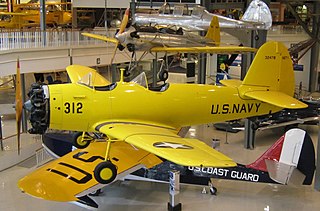
The Timm N2T Tutor is an American training monoplane built by the Timm Aircraft Corporation for the United States Navy as the N2T-1.
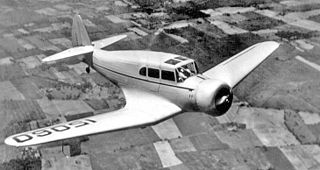
The Fairchild Model 45 was a 1930s American five-seat cabin monoplane aircraft designed and built by Fairchild.
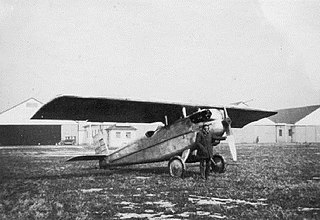
The Dornier Do H Falke (Falcon) was a German single-seat fighter, designed by Claude Dornier and built by Dornier Flugzeugwerke. Although an advanced design for its time, being evaluated by the United States Navy as the Wright WP-1, it did not go into production.

The General Aircraft ST-18 Croydon was a 1930s British cabin monoplane built by General Aircraft Limited.
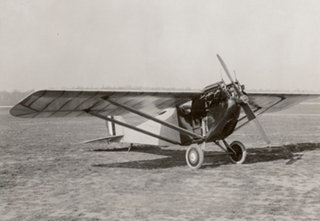
The Loening M-8 was a 1910s American fighter monoplane designed by Grover Loening and built by his Loening Aeronautical Engineering Company. The order for 5000 for the United States Army Air Corps was canceled when the First World War ended.

The Martin MB-1 was an American large biplane bomber designed and built by the Glenn L. Martin Company for the United States Army Air Service in 1918. It was the first purpose-built bomber produced by the United States.

The Seversky SEV-3 was an American three-seat amphibian monoplane, the first aircraft designed and built by the Seversky Aircraft Corporation.

The Culver Model V is a two-seat cabin monoplane designed and built by the Culver Aircraft Company.

The Breda Ba.75 was an Italian prototype two-seat reconnaissance and ground-attack aircraft designed and built by the Società Italiana Ernesto Breda. Only one aircraft was built and the type did not enter production.

The Curtiss GS aircraft were two types of similar scout aircraft designed and built by the Curtiss Aeroplane and Motor Company for the United States Navy.

The Darmstadt D-29 was a German experimental monoplane designed and built by Akaflieg Darmstadt. The D-29 was a cantilever low-wing monoplane designed and built during 1936 with a conventional landing gear with a tailskid. It was powered by a Siemens-Halske Sh 14a radial piston engine and had enclosed tandem cockpits, as well as a number of other features, including hydraulically actuated trailing-edge flaps, a braced T-tail and leading-edge slots.

The Curtiss Model 22 Cox Racers were two specialised racing aircraft built by the American Curtiss Aeroplane and Motor Company. The type was flown as a monoplane, biplane and triplane.
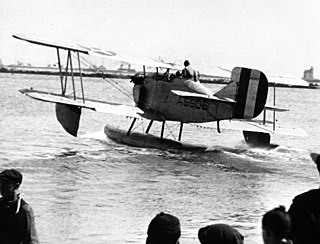
G Elias & Brother was an American manufacturer of cabinets and aircraft based in Buffalo, New York in the 1920s. A.G. Elias sat on the Manufacturers Aircraft Association's board of directors along with President Frank H. Russell, VP Glenn L. Martin, Charles L. Laurence, Chance M. Vought, S.S. Bradley, George P. Tidmarsh, and Donald Douglas. E.J Elias promoted the construction of a Buffalo municipal airport to aid the local fledgling airplane industry of five aviation companies constructing airplanes and airplane parts. From 1920 to 1925, Elias company's chief engineer, David Earle Dunlap (1896-1957), designed the Elias EM-2 Expeditionary planes. He designed the NBS-3 bomber fuselage and the Elias M-1 Mail plane. Dunlap's Elias TA-1 design was the first United States Army Air Corps Trainer to have a radial engine. After tests a McCook Field, the Army Air Corps selected other manufacturers over the Elias bomber and trainer. The company designed the Elias EM-1 to meet requirements for a multirole amphibian marine expeditionary aircraft. Elias delivered six production Elias EM-2 aircraft with Liberty engines to the United States Navy in 1922.




















